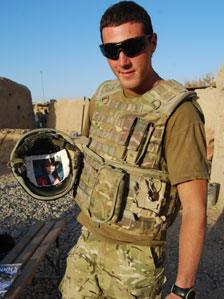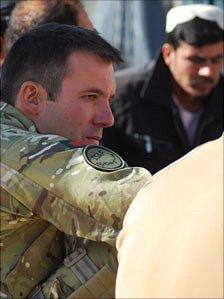Welsh troops' view from Afghanistan
- Published
As the battle against the Taliban continues in Afghanistan, BBC Wales' Colette Hume spent time embedded with the Royal Welsh troops. Here is the first in a series of her experiences.
The first shots rang out shortly after dark, an unexpected punctuation to the evening call to prayer.
They became frenetic, the automatic gunfire puncturing the cold, clear calm of the Helmand night. The thud of a rocket-propelled grenade the confirmation - as if any was needed - of a firefight between the Afghan National Police and the Taliban.
From my vantage point of a patrol base run by soldiers from The Royal Welsh, I listened to this strange morse code of combat as it crackled across the darkness.
The orange red glow of tracer fire streaking across the inky blackness lit up the fighting in the distance.
Less than 1,500m from where I stood, surrounded by soldiers and their Afghan interpreter, I listened as men tried to kill each other.
Within a few minutes a new sound - and one said to be feared by the Taliban - the low rumble of the Warrior armoured vehicles being sent to help the police repel the insurgents.
For the men of B Company this was a relatively quiet night. The Afghan police officers and civilians who found themselves under fire at the police station were unharmed. The insurgents escaped into the freezing night.
B company left their barracks in Tidworth, Wiltshire back in late July. Their home is now a patrol base a few kilometres north of Lashkar Gah. It's a traditional Afghan compound with a patchwork of rooms and courtyards surrounded by newly-constructed sentry posts known as sangars from where the soldiers keep watch day and night.
They're surrounded by pockets of Taliban fighters. Local farmers bringing in the last of the harvest are the soldiers' nearest neighbours.
The soldiers have become adept at differentiating between the innocent farmworker kneeling in the long grass to pray and the insurgent crouching, getting ready to launch a deadly attack.
From his position high in the sanger, Private Daniel Powell from Cardiff showed me the cracks caused by bullets hitting the strengthened glass, the result of the latest attempt by the Taliban to kill Isaf forces.
Earlier in the safety of the patrol compound he removed his helmet to show me the photo of his girlfriend Zoe he keeps tucked inside the webbing. She is, he says, his lucky charm, watching over him.

Pte Daniel Powell from Cardiff keeps a photograph of his girlfriend Zoe in his helmet when he goes out on patrol
"The hardest thing is being away from her, I miss the time we spent together when we're at home," he said.
Their home for this six month tour is a cold and primitive affair without running water or much power. The soldiers sleep in mud and straw-built rooms without doors and windows. The thatched rooves are riddled with holes, while mice devour any food left at ground level.
The cold is a constant and unwelcome feature of life here. Night-time temperatures in southern Helmand are now well below freezing. Many choose to sleep in not one but two sleeping bags. Until just a couple of weeks ago ration packs were the only food. The arrival of two cooks was an important boost to morale.
Months on edge
Every day Rorke's Drift Company leave the relative safety of their base to patrol the local villages on foot or in their armoured vehicle. Improvised explosive devices (IEDs) remain the biggest threat. Three weeks ago Private Gareth Bloodworth's vehicle hit one such device.
"Everything just went blank as if someone had put white paper in front of my eyes," he said. "My ears were ringing; everything just stopped. I can't really explain it, I wouldn't want anyone to experience it."
I asked him if his experience left him frightened.
"I'd be stupid to go out on patrol and not be. Yeah, I am frightened," he said.
If the soldiers face great danger in their armoured vehicles, they're even more exposed out on foot. They carry at least an extra 25kg of weight in body armour, a helmet, ammunition and supplies including food and water. They know their lightly armed enemies call them "the donkeys".
For the strategists in London and Washington this Nato led mission is one of peace and security for Afghanistan. For the men of B company, working in one of the most dangerous places on earth, this is simply a matter of survival.
How much their family and friends back at home know about the risks the men face depends on who you talk to. One soldier says his wife and children think he has a desk job in Camp Bastion, some said they tell their fathers more than their mothers, while others tell their families as much as they can on their return and then try to regain some kind of normality after months on edge by never mentioning their experiences again.
One soldier told me: "If my missus really knew what we do here, well, I don't think she could handle it. Telling her I'm at Bastion means she doesn't worry quite so much."

Maj Mark Beynon drinks chai with village elders at a shura
A few days before the skiirmish between the Afghan national police and the Taliban I watched as Major Mark Beynon, the officer commanding Rorke's Drift Company sat cross-legged at an Afghan national police station, drinking tea and talking to local elders about the security situation.
The soldier-diplomat listened to their worries about Taliban intimidation and their demands for more aid, for schools and clinics. He told me of his confidence in the partnership between his soldiers and the local police.
"We've good a good and proactive police commander," said Maj Beynon.
"His men are locals and know the area well, so within the villages and hamlets we look after the Taliban might transit through but in terms of a permanent presence we don't see much of them here."
But they are in the area. And incredibly close to the soldiers. One of the young officers unfurled a large map pointing out the Taliban presence which ringed the base.
When I asked him how far I would need to walk from the base before I encountered insurgents he gave me a gentle smile and told me: "Just a few hundred metres," before tracing a finger across the cobweb of roads and tracks to show me just how close they really are.
- Published12 December 2010